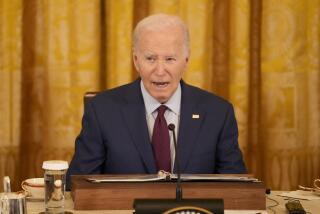Student loans and Social Security taxes: a poor fit
Democrats have seized on a looming increase in the interest rate on certain federal student loans as their latest wedge issue, hoping to portray Republicans as caring more about the wealthy than they do about working-class and middle-income college students. Those students might want to spend a few moments studying how Senate Democrats planned to come up with the money to pay for one more year of cheaper loans.
Senate Majority Leader Harry Reid (D-Nev.) tried to start debate on his student loan interest rate proposal Tuesday, knowing full well that he didn’t have the 60 votes needed to stop a GOP filibuster. And sure enough, the effort failed on a party-line vote of 52 to 45. The speechifying continued Wednesday.
Republicans opposed the bill because it would increase taxes on small-business “job creators.” The ones targeted here aren’t garden-variety “millionaires and billionaires” but rather partners in small professional services companies who earn at least $200,000 in taxable income. To Democrats, the Republicans’ stance is just more fuel for the argument that the GOP is the party of the wealthy.
“Not one senator would join us to bring this bill to the floor!” Sen. Dick Durbin (D-Ill.) said Wednesday, with seeming incredulousness. He went on to talk about the terrible debt burden that many students face the day they earn their degrees -- in aggregate, more than all Americans owe in credit-card debt.
Underneath all the politicking, however, is a lesson for the younger generation about federal budgeting. Political realities may have forced Democrats to propose a way to cover the cost of extending the loans’ reduced interest rate. But the federal government’s approach to accounting, which combines all revenue streams into a single “unified budget,” enables Congress to offset new spending of any kind by increasing the revenue that a federal trust fund collects -- even if the money in that fund is reserved for other purposes.
In the case of the student loans, the Democrats’ bill would require certain Americans -- high-income partners in small businesses that provide professional services, such as engineering or lobbying -- to pay payroll taxes on their share of the firm’s profits. That’s a long way of saying the bill would eliminate a tax-avoidance strategy that some small firms use to reduce their contributions to Social Security and Medicare.
Payroll taxes flow into the trust funds for retirement, disability and Medicare benefits. And nothing in the bill diverts the taxes out of the trust funds to pay for student loans. But then, no diversion is required under the unified budget. For the purposes of calculating the federal deficit, all types of revenue are counted against all types of spending.
In other words, the additional money flowing into the trust funds would provide political cover for more borrowing, in this instance for the sake of student loans. Borrowing isn’t a bad thing if it’s kept in proportion. Such is not the case today, however. The government is building up debt faster than the economy is expanding, which means a growing share of the federal budget has to be spent on interest payments.
That’s more to the detriment of the people who now are taking out student loans than to their parents’ generation. Assuming these collegians eventually find jobs, a growing percentage of their tax dollars will be frittered away on interest payments rather than on services they might benefit from.
As I’ve written before, the Senate Democrats’ payroll tax proposal might pencil out, but it’s bad policy. Congress has a long history of using trust fund revenue to make deficits seem smaller than they really are, so the Democrats aren’t breaking any new ground here. But if they want to eliminate payroll tax loopholes, they should do so only to shore up the finances of Medicare and Social Security, not to mask the impact of more deficit spending.
ALSO:
U.S. manufacturing’s next phase
Mitt Romney saved Detroit? Really?
Kinsley: Overvaluing the free market
More to Read
A cure for the common opinion
Get thought-provoking perspectives with our weekly newsletter.
You may occasionally receive promotional content from the Los Angeles Times.







